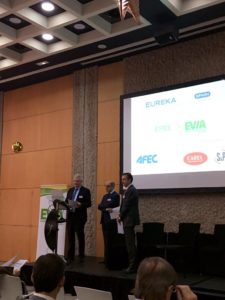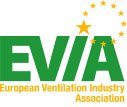EUREKA Spain highlights the HVACR industry’s continued commitment to developing technologies to deliver climate change ambitions
13/12/2019

The EUREKA Roadshow made its timely third stop in Spain, in the shadows of the UNFCCC COP 25, for another half-day conference to debate how the HVACR industry can continue to deliver its share of CO2 reductions. Buildings and the cold chain again constituted the focus of discussion on the opportunities that can be harnessed for industry and for consumers as new technologies proliferate.
Brussels, 13 December 2019 – For its third instalment EVIA and EPEE took the EUREKA Roadshow concept to Madrid, Spain, on 10 December 2019. The aim as with previous editions of the EUREKA concept was to discuss the trends that the HVACR sector must accommodate to adapt to be ready for the demands of the coming years. The event was sponsored by CAREL and Soler & Palau, with welcome support provided by the Asociación de Fabricantes de Equipos de Climatización (AFEC).
Joan Miro Ramos, Chairman of the EVIA, and Juergen Goeller, Chairman of EPEE highlighted the significance of Spain as host of the Roadshow with world leaders gathered in Madrid to renew, reinvigorate and respect commitments to tackle climate change.
Coinciding with the new European Commission’s launch of its flagship European Green Deal, the event is an opportunity to stress that the HVACR sector stands ready. Ready to consolidate the large energy efficiency gains that have already been delivered by the sector and to fully engage in identifying the policy trade-offs for the next stage of savings. Ready to participate in constructing, via consultative exercises like EURKEA Spain, as wide a business and political constituency as possible to deliver them and to ensure that equally important issues including Indoor Air Quality (IAQ) and connectivity are effectively prioritised at the EU level.
Discussions in the Panel Session on Buildings praised the efforts of regulators and industry in delivering efficiency savings by designing more efficient products and taking a more holistic, integrated approach. Pilar Budi, Director General of AFEC stated that “given the right policy context digitalisation and the Internet of Things (IoT) will facilitate more efficient, greener product use which is the next big step in energy savings”. All participants agreed that this will require implementing the EU’s directive on buildings’ energy performance in a coherent manner across the EU and rigorously and ambitiously in the Member States themselves. Including requirements for the installation of technical building systems and the voluntary scheme to rate the smartness of buildings. Participants also stressed additional benefits from smart buildings from data to boost refurbishment rates to improving IAQ.
Participants in the Cold Chain Panel unanimously agreed that rising global temperatures will increase the importance of refrigeration and space cooling technologies. Andrea Voigt highlighted that “whilst improving the energy efficiency of such products contributes to mitigate climate change these technologies will also play a central role in tackling the other element of the climate imperative, adaption. Increased demand for cooling will require the deployment of innovative technologies to boost the uptake of sustainable cooling – an EPEE priority – via new business models and underpinned by increased consumer awareness. Participants agreed that the F-Gas Regulation in phasing down the use of HFCs has helped to drive the move to lower GWP solutions, but agreed that safety standards, incentives to retrofit existing installations and still insufficient awareness on the ground are slowing efforts. Thorough market surveillance of imports of gases, training programmes for installers to prepare for example for flammable refrigerants and for increasing digitalisation, and wider recognition of sustainable cooling as a priority to address climate change, were identified as policy priorities.
“Taking the EUREKA concept to Spain again highlighted just how important rigorous implementation of EU climate legislation is in the Member States if the EU is to deliver on its ambitions on climate neutrality. The trip to Spain also provided a timely reminder that national context matters. In Spain building regulations are regional and local, national implementation of the EPBD in Spain should prescribe a clear and consistent strategy for the authorities to follow.” – Joan Miro Ramos, EVIA Chairman
EUREKA will return with a third flagship policy conference in spring 2021. A fourth instalment of the Roadshow will visit another EU Member State in late 2020. Stay tuned!
***

